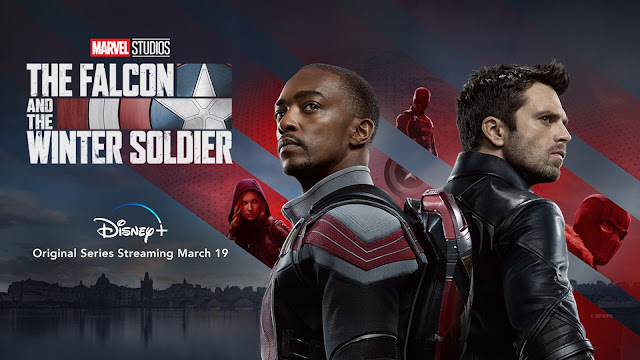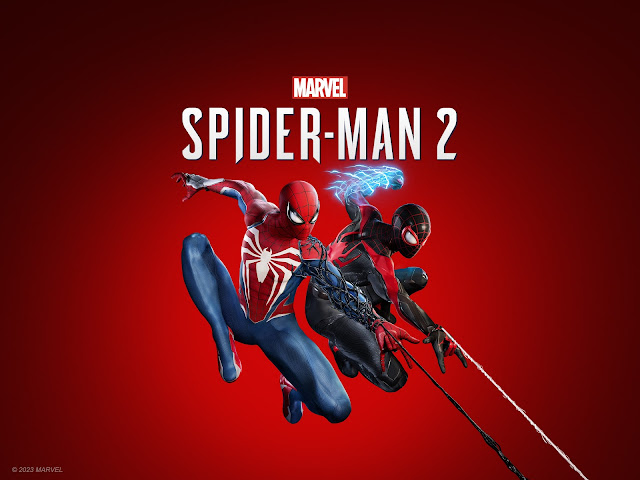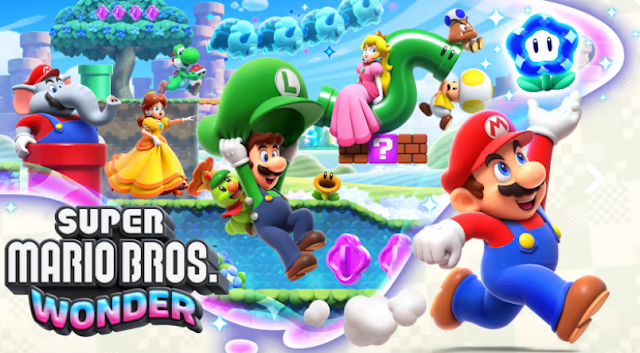"The Falcon and the Winter Soldier" Review
When Marvel announced their initial slate for the MCU's Phase Four, the project I was looking forward to the most from the initial offerings was definitely "Falcon and the Winter Soldier". Even before the pandemic shuffled things around (this was going to come out after "Black Widow" and before "The Eternals" and "WandaVision"), I was looking forward to this simply because both "Captain America: The Winter Soldier" and "Captain America: Civil War" are my top two favorite movies of the entire MCU. The later movies of the "Captain America" trilogy stood out to me not just because they were some fine action movies, but married their action to thrilling, thought provoking themes you don't see elsewhere in the MCU. Anchoring those movies obviously was Chris Evans' Steve Rogers who proved to be the heart and soul of this shared universe. With "Avengers: Endgame" essentially retiring the character seemingly for good, I was very curious how a series like "Falcon and the Winter Soldier", which based on the trailers seemingly looked and felt like those movies, would fare without the main character that tied it all together.
For the most part, as an action series with important character development and resonant themes, "Falcon and the Winter Soldier" succeeds where it counts, despite some hard stumbles along the way.
Unlike the wild stylistic swing that was "WandaVision" earlier this year, you'd be hard pressed to watch "Falcon and the Winter Soldier" and absolutely not think this series absolutely feels like a direct sequel to the "Captain America" trilogy. From the way the action is framed, the more serious tone to even using the same composer in Henry Jackman, it's clear Marvel's intention was to recapture the shine and glory from the Cap movies in TV form. But even if they were not capable of making this show look like those movies (thankfully they did), "Falcon and the Winter Soldier" needed to nail the two more important aspects, which were its characters and its themes. From that perspective, what this show did for the characters of Sam Wilson and Bucky Barnes are its most important trait.
"Avengers: Endgame" ended with Steve Rogers passing the torch to Sam Wilson to become the new Captain America. Considering how plot heavy and packed that movie was, it's not its fault that it didn't have the time to explore the implications of what it means for the world to have a new Captain America, specially one that looks like someone like Sam Wilson. It is no secret that one of the biggest themes around "Falcon and the Winter Soldier" deals directly about race and America's history with its treatment to black people. Considering that this show started filming in late 2019 and had to halt filming its final episodes right as the COVID-19 pandemic halted all production, I wonder if executive producer Malcolm Spellman and his team of writers could have predicted just how timely one of the big themes of the show would end up being considering what befell to America after the George Floyd protests last summer.
Unintentional timing or not, it gave the show more weight, and fit right into the spirit of the early Captain America comics as commentary to current real world turmoil. Seeing how the show directly addresses racism not only through Sam Wilson's overall character arc as he grows the motivation to embrace the Captain America mantle, but also with his interactions with the secret and long forgotten super soldier Isaiah Bradley (played by Carl Lumbly) gives it more resonance than you would expect from an MCU property. As someone that has felt a lot of empathy to the plight of black people in America over the past year, Isaiah Bradley's scenes in the fifth and sixth episodes definitely left me choked up quite a bit.
Within all this, it has to be said how important this show has been for the character of Sam Wilson. Basically Cap's direct sidekick in both "Winter Soldier" and "Civil War", he was always a fun presence to have around, but not necessarily the most interesting or fully formed character in the MCU. I liked Anthony Mackie fine as an actor, but the previous movies didn't quite give him too much to work with other than the cool action scenes with his wings. "Falcon and the Winter Soldier" rightfully brings him front and center, and while his action scenes are cool, more important were the more intimate scenes where he has to deal with his family problems back in Louisiana, the prejudices he has to face just for being a black man, and the desire to fully embrace Steve Rogers' final wish after initially rejecting it. His interactions with Sebastian Stan's Bucky Barnes help round out his character arc, as the two continue some of the fun rapport briefly glimpsed in "Civil War" that helps liven up what's ostensibly a very serious show. Through all of this, Anthony Mackie finally fully grows into his role, and I fully believe him as our next Captain America.
Not to be outshined, but Bucky is also a very important piece of this show (obviously since he shares the second half of the title). While Sam definitely benefitted a lot from this show, I would say Bucky didn't need as much work because the Cap movies already gave him a bit more to work with when he transitioned from the outright villain in "Winter Soldier" to something more ambiguous on "Civil War". "Falcon and the Winter Soldier" does give him some much needed intimate moments that show the trauma he still deals with over his time as Hydra's deadly assassin, and how he deals with it and ultimately grows from it also provides some much more needed catharsis for the series.
Not only does "Falcon and the Winter Soldier" use the post-Snap world to dovetail into how America needed their new Captain America (which we see when we are introduced to the immediately hate-able replacement John Walker, played brilliantly by Wyatt Russell), it also ties its story about a group called the Flag Smashers whose intent is to bring the world back to how it was during the 5-year period half of the world's population was gone. While some of the Flag Smashers ideals do resonate in its themes of isolationism and government overreach, the show surprisingly doesn't have enough time to handle all of it at once. Because the show its dividing its time dealing with Sam's plight and the themes of race, Bucky's soul searching in his post-Winter Soldier stint, its new, more intense Captain America, a mystery surrounding someone called the Power Broker (which dovetails into the reintroduction of Baron Zemo and Sharon Carter, who were both last seen in "Civil War"), the Flag Smashers who should have been the centerpiece of the main plot, come off as a bit one dimensional in the grand scheme of things. It is a massive shame considering that their ideals on paper were some worth exploring from their perspective (and are not too dissimilar to when the MCU provided context from the villain side in a proper way with Killmonger in 2018's "Black Panther").
It also doesn't help that "Falcon and the Winter Soldier" completely misfired when it came to the face of the Flag Smashers with Karli Morgenthau (played by Erin Kellyman), a character that just didn't bring the charisma needed to push the group beyond the terrorist organization it ended up being painted as (and the actress was really weak in the role on top of that). More nuance was needed with this group, and while the show nailed the nuance with its themes about race, it whiffed the ball hard when it came to this group. As antagonists, they just weren't compelling enough considering this same show had other villain characters that could have made better antagonists. In particular, they had a gem of a character with John Walker, who was so immediately hate-able before showing that, amidst his intense aggressiveness, he had good intentions before being shunned by the US Government after a very scandalous international incident got him dishonorably discharged from being Captain America. Him being tied to America's preference for a person that represents the ideal "image" was what helped the show dig a little deeper to America's history with race, and its unfortunate that any potential the show had in directly taking that thread to the finish line got sidetracked by the Flag Smashers and will have to be resolved with whatever comes next to pick up from here, whenever that may be.
Ironically, just like I stated back in my WandaVision review, in the end I ultimately also feel a little conflicted in how I feel about "Falcon and the Winter Soldier" now that the entire show is done. A pattern is starting to form with the MCU Disney+ shows where I'm noticing where they have clear strengths and where they have clear weaknesses. Just like WandaVision, the biggest strength for "Falcon and the Winter Soldier" entirely rests on how it gets the main title characters right, while whiffing the ball a bit in what surrounds it. Just like the weirdness of "WandaVision" and its ultimate study of grief was what carried the show overall despite its final stumbling, what this show does for both Sam Wilson and Bucky Barnes and how it deftly handled the topic of race in a time where race is such a sensitive topic is what I will takeaway the most from this show. Yes, how everything else was handled leaves a tinge of dissatisfaction. With that said, I just have to think about Sam's speech to the world leaders at the end, and his final gift to Isaiah Bradley, to remember that when this show hit, I got misty eyed.
"Falcon and the Winter Soldier" once again proves that character above all else is why the MCU continues to thrive all these years later, and it's what helps it weather any muddled plotting. And with a clear renaming in the end to "Captain America and the Winter Soldier" (unlike "WandaVision" clearly being more of a one-off), I have a little more faith a proper continuation of this story will better handle or continue handling all the things that were too much for this series to chew.
And with that, the wait for "Loki" begins.
★★★☆
3.5/5
Recommended
Written by Alejandro Segovia
TV Scoring rubric:
★ : 1 point ☆ : 0.5 points
★★★★★: Essential. Excellent episodes. Close to flawless. Transcends any minor flaws it may have.
★★★★: Great/Highly recommended. Great episodes. Some flaws worth mentioning, but nothing to worry about.
★★★: Okay/Recommended. Good episodes. Contains things worth watching & experiencing, but flaws can hinder the experience.
★★: Caution/Questionable. Mediocre episodes. The flaws start to significantly hinder anything good the episode has.
★: Avoid. Bad episodes with nothing redeemable about them (some enjoyment as "so bad its good). Preferably don't waste your time.








Comments
Post a Comment